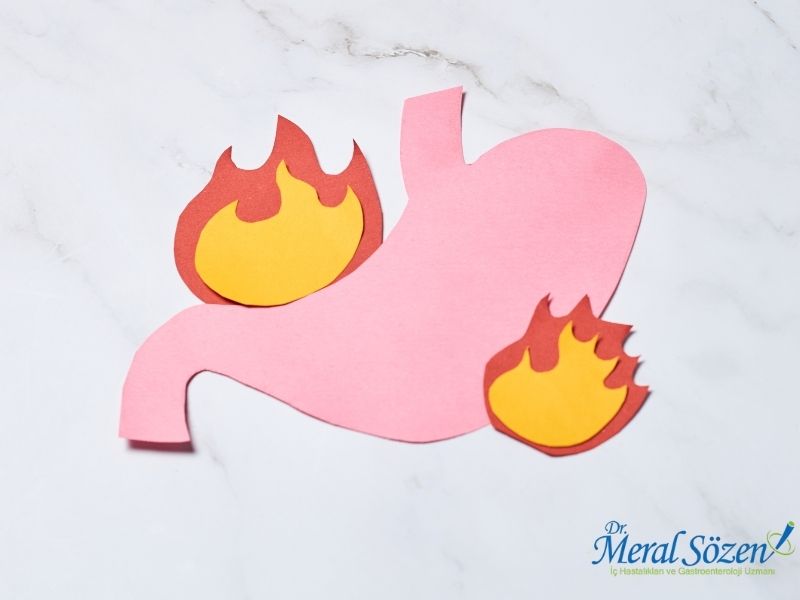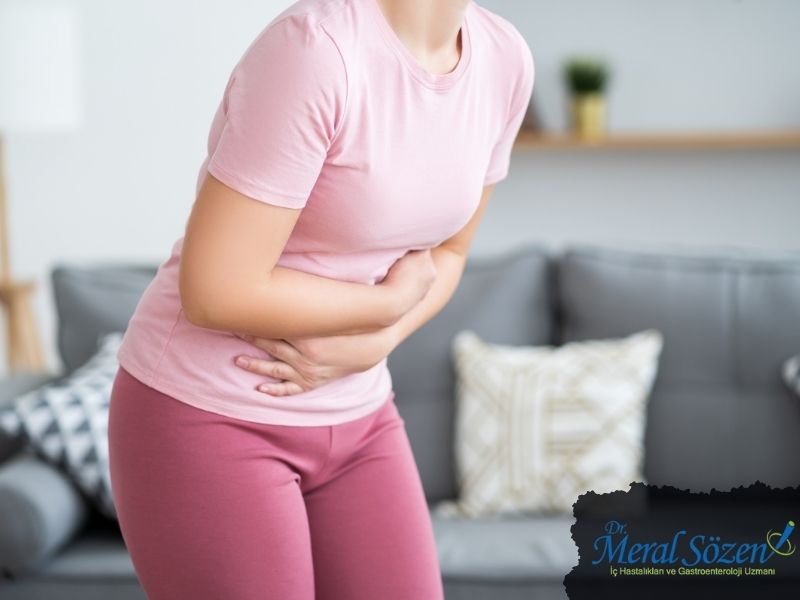- Gastritler
- Fonksiyonel Dispepsi
- Mide Ülserleri
- Mide Kanseri Taraması
İçindekiler
- Gastrit Nedir?
- Gastrit Belirtileri Nelerdir?
- Gastrit Tanısı Nasıl Konur?
- Gastriti Olan Hastalarda Beslenme Nasıl Olmalıdır?
- Gastritte Hangi İlaçlar Kullanılmaktadır?
- Gastrit Tedavisi Ne Kadar Sürer?
- Gastrit Tamamen İyileşir mi?
- Gastrit Tedavisinde Bitkisel Tedaviler Nelerdir?
- Gastrit Mide Bulantısı Yapar mı?
- Gastrit Çeşitleri Nelerdir?
- Gastrit Kansere Dönüşür mü?
- Gastrit İle Ülser Başlangıcı Aynı mı?
- Gastrit Kansere Döner mi?
- Gastrit Bağırsağı Etkiler mi?
- Fonksiyonel Dispepsi
- Fonksiyonel Dispepsi Nedir?
- Peki Mide Ağrısından Ne Zaman Korkmalıyız?
- Mide Ülseri
- Mide Ülseri Nedir?
- Mide Ülserinin Belirtiler Nelerdir?
- Mide Ülserine Neden Olan Faktörler Nelerdir?
- Mide Ülser Tanısı Nasıl Konur?
- Mide Ülseri Tedavisi Nasıl Yapılır?
- Mide Yarasında Bitkisel Tedavi Kullanılır mı?
- Mide Ülserinde Diyet Nasıl Olmalıdır?
- Mide Yarası Kansere Döner mi?
- Mide Kanseri
- Mide Kanseri Nasıl Gelişir?
- Mide Kanseri Gelişimine Neden Olan Risk Faktörleri Nelerdir?
- Mide Kanseri Tanısı Nasıl Konur?
- Mide Kanseri Tedavisi Nasıl Yapılır?
- Mide Kanserinden Korunmak İçin Neler Yapılmalıdır?
Gastrit Nedir?
Gastrit genel anlam olarak mide duvarının çeşitli nedenlerle gelişen iltihabı reaksiyonudur. Toplumda sık olarak görülen gastritin belirtileri kişiden kişiye farklılık gösterir. Bu farklılık nedeniyle hastalar doktor doktor gezerek sorunlarına çözüm aramaktadır. Ankarada gastroenteroloji alanında hizmet veren Dr Meral Sözen bu yazıda “ Gastrit belirtileri nelerdir?”,“ Gastrit tanısı nasıl konur?”, “Gastriti olan hastalarda beslenme nasıl olmalıdır?”, “Gastritte hangi ilaçlar kullanılmaktadır?”, “Gastrit tedavisi ne kadar sürer?”, “Gastrit tamamen iyileşir mi?”, “Gastrit tedavisinde bitkisel tedaviler nelerdir?”, “Gastrit mide bulantısı yapar mı?”, “Gastrit çeşitleri nelerdir?”, “Gastrit kansere dönüşür mü?”, “Gastrit ile ülser başlangıcı aynı mı?”, “Gastrit kansere döner mi?” sorularına cevap verecektir.
Gastrit Belirtileri Nelerdir?
Kişiden kişiye değişiklik göstermekle birlikte açlıkla artan ağrı, midede yanma, hazımsızlık, şişkinlik, midede sürekli dolgunluk hissi, geğirme, ağız kokusu olabilmektedir.
Gastrit Tanısı Nasıl Konur?
Hastaların şikayetleri dinlenip fizik muayene yaptıktan sonra buna neden olabilecek metabolik hastalıklar ve mide mikrobu olup olmadığına dair testler yapılır. Şikayetlerin şidddeti ve süresine bağlı izlenecek tedavi yolu değişmektedir. Kısa süreli yakınmalarda genellikle endoskopik inceleme önerilmezken ilerleyen süreçte şikayetlerin sıklaşması beslenme önerileri ve yaşam tarzı değişiklikleri ile düzelmeyen ilaç tedavisine yanıt vermeyen yada ileri yaşta ailede kanser öyküsü bulunan hastalarda endoskopi planlanmalıdır. Endoskopik olarak gastrit normal duvar görünümden daha kırmızı ve şiş görülmektedir. Bu durumda bu gastrite neden olacak etkeni belirlemek için biyopsi yapılamalıdır.
Gastriti Olan Hastalarda Beslenme Nasıl Olmalıdır?
Gastriti olan hastalarda uzun dönemde sürekli uygulaması gereken yasaklardan oluşan bir diyet listesi verilmemektedir. Ancak kısa süreli midenin rahat sindireceği dinlenmesini sağlayacak beslenme önerilerinde bulunulabilir. Sigara ve alkol gibi alışkanlıklar aşırı stres şikayetleri artırmaktadır.
Gastritte Hangi İlaçlar Kullanılmaktadır?
Gastrit tedavisinde altta yatan nedene yönelik tedaviler uygulanmaktadır. Örneğin helikobakter pilori dediğimiz mide mikrobuna bağlı gastritlerde antibiyotik tedavisi uygulanırken, mikrobun eşlik etmediği gastritlerde mide asidini baskılayan tedaviler uygulanmaktadır. Atrofik gastrit eşlik ediyorsa mide asidini baskılayan tedavilerden kaçınırız. Yani bu durum hastadan hastaya değişmektedir ve tedavi bireysel olarak düzenlenmektedir.

Gastrit Tedavisi Ne Kadar Sürer?
Hastanın şikayetlerinin süresi sıklığı ve şiddeti tedavi süresini belirlemekte etkin rol oynamaktadır. Bu yüzden bu karar bireysel olarak verilmelidir.
Gastrit Tamamen İyileşir mi?
Akut gastritlerde iyileşme genellikle hızlı olurken kronik gastritin olduğu hastalarda tamamen iyileşme daha geç olabilir. Altta yatan etkenler ve eşlik eden diğer risk faktörleri iyileşme sürecinde önemli rol oynamaktadır.
Gastrit Tedavisinde Bitkisel Tedaviler Nelerdir?
Hak arasında birçok tedavi kulaktan dolma bilgiler şeklinde yayılırken bilimsel veriler eşliğinde dozlaması düzgün yapılmış ilaçlar bitkisel tedavilerden daha etkindir.
Gastrit Mide Bulantısı Yapar mı?
Gastriti olan bireylerde mide bulantısı sık görülen bulgulardan biridir. Özellikle belirli yiyecekler ile bulantı sıklığı artmaktadır. Akut gastritlerde bulantıya daha sık rastlanır.
Gastrit Çeşitleri Nelerdir?
Gastritler başlangıç süresine, yerleşim yerine ve altta yatan nedene göre farklı gruplara ayrılmaktadır. Başlangıç sürecine göre akut ve kronik gastritler olarak ayrılırken, yerleşim yerine göre antral gastrit, pangastrit vs şeklinde ayrılmaktadır. Altta yatan nedene göre değerlendirirsek atrofik gastrit, otoimmun gastrit, helikobakter pilori gastriti vb şeklinde ayrım yapılabilir.
Gastrit Kansere Dönüşür mü?
Bütün gastritler kansere dönüşmez. Ancak genetik yatkın bireylerde helikobakter piloriye bağlı gastritlerde lenfoma riski artmaktadır. Ayrıca atrofik gastrit zemininde hücresel değişiklikler ile kansere dönüşüm olabilmektedir.
Gastrit İle Ülser Başlangıcı Aynı mı?
Ülser başlangıcı halkın durumu kolay anlaması adına oluşturulmuş bir tabir olup çok yoğun gastrit olduğunu yer yer küçük tahrişlerin olduğunun ifade etmektedir.
Gastrit Kansere Döner mi?
Atrofik gastritlerde displazi varlığında kanser gelişme ihtimali normal popülasyona göre artmıştır.
Gastrit Bağırsağı Etkiler mi?
Gastrit terim gereği mideye sınırlı iltihabı reaksiyonu ifade etmektedir. Ancak sindirim sisteminde herhangi bir yerde problem olduğu zaman diğer kesimlerde buradan etkilenmektedir. Ayrıca sindirim sisteminden kaynaklanan ağrılar aynı sinir ileti sistemi üzerinden taşındığı için birbirinin ağrısı ile karışabilmektedir. Burada eşlik eden problemler değerlendirilerek ayırıcı tanı yapılmalıdır.
Fonksiyonel Dispepsi
Çevremizde çoğu zaman karşılaşırız “doktor doktor gezdim şu mide şikayetlerime bir çözüm bulamadım “ diye birçok kez muayene olmuş türlü tetkikler yapılıp tedaviler verilmiş ancak şikayetleri geçmeyen bu problemlerden muzdarip olan hasta grubunu… çoğunlukla ardından şu ifadeler gelir “psikolojikmiş dediler ne alakası var psikoloji ile midemin ağrısının…” Bu durum böyle sürer gider.
Fonksiyonel dispepsi; altta yatan bir organik patoloji (yani bizim yaptığımız testlerle tespit edilemeyen) bulunmaksızın karnın üst kesiminde olan yanma, ağrı, hazımsızlık, şişkinlik ve reflü benzeri belirtilerin olması durumudur. Bu hastalarda üst gastrointestinal sistem grafisi de dahil olmak üzere birçok test yapılır. Bazen farklı sebepler saptanır ancak hasta verilen tedaviden fayda görmez işte bu durumda akla fonksiyonel dispepsi gelmelidir.

Fonksiyonel Dispepsi Nedir?
Fonksiyonel dispepsi; yapılan testlerde altta yatan bir patoloji olmaksızın uzun dönem devam eden mideye uyan bölgede ağrı, yanma, karın ağrısı, hazımsızlık, ülser benzeri ağrı ile karakterizedir.
Fonksiyonel dispepsisi olan hastaların en sık sorduğu sorular şunlardır:
- Mide ağrıma neden bulunamadı, ben hep mide ağrısı ile mi yaşayacağım?
- Su bile içsem davul gibi şişiyorum ne yapmalıyım?
- Mide ağrısından kıvranıyordum mide ülseri var diye doktora gittim bir şey yok deyip doktor beni geri gönderdi. Şimdi ne yapmalıyım?
- Mide ağrımı geçirmek için ne yapmalıyım?
- İlaçlarda fayda görmedim mide ağrıma ne iyi gelir?
Bu sözleri söylüyorsanız büyük ihtimalle fonksiyonel dispepsi hastasısınız. Bu durum genellikle midenin mide asidine duyarlılığının artması ve psikolojik faktörlerin sindirim sistemine etkisi ile açıklanmaktadır. Bu durumda organ duyarlılığını azaltacak birtakım ilaçlar hastaların tedavisine eklenmektedir. Bunların yanısıra hastalara psikolojik stresle başa çıkma ile ilgili yöntemlere başvurması önerilmektedir.
Peki Mide Ağrısından Ne Zaman Korkmalıyız?
Mide ağrısı durumu süreklilik arzediyorsa, bulantı ve kusma eşlik ediyorsa, mide ağrısı sırta vuruyorsa, mide ağrısı gece uykudan uyandırıyorsa, mide ağrısı ile birlikte belirgin zayıflamanız varsa bu durumda vakit geçirmeden doktora başvurmalısınız.
Ankara’da mide ağrısı şikayeti ile başvuran hastalarda öncelikle hastalık öyküsü ve değerlendirme yapılmaktadır. Mide ağrısı şikayeti olan kişilerin mutlaka endoskopi yapması gerekmeyebilir ancak yapılan muayene ve tetkikler ile endoskopi yapılıp yapılmayacağına karar verilmelidir. Mide hastalıklarının çoğunluğu mide ağrısı ile seyretmektedir. Mide ağrısı nedeni basit bir gastrit olabileceği gibi mide kanseri de olabilir.
Ankarada mide ağrısı, dirençli mide ağrısı nedeniyle binlerce hasta görmüş ve tedavi etmiş Dr. Meral Sözen bu bilgi birikimi paylaşmak için mide ağrısı hastalarını muayenehanesinde tedavi etmek için beklemektedir. Ankarada devlet hastanelerine mide ağrısı ile başvuran birçok hasta bulunmaktadır ve hastalar şikayetlerine kesin çözüm bulunamadığını düşünerek başka devlet hastanelerine de mide ağrısı ile başvurmaktadır. Ankarada özel hastanelerde de birçok hasta mide ağrısı ile tedavi görmektedir.
Mide Ülseri
Toplumda sıklığı oldukça sık olup insanların %5-10’unda hayatının bir döneminde muzdarip olduğu mide ülserinin tanısı ve tedavisi oldukça kolaydır. Dr Meral Sözen bu yazısında “Mide ülseri nedir?”, “Mide ülserinin belirtiler nelerdir?”, “Mide ülserine neden olan faktörler nelerdir?”, “Mide ülser tanısı nasıl konur?”, “Mide ülseri tedavisi nasıl yapılır?”, “Mide yarasında bitkisel tedavi kullanılır mı?”, “Mide ülserinde diyet nasıl olmalıdır?”, “Mide yarası kansere döner mi?” sorularının cevabını bulabilirsiniz. Ankara’da mide ülseri nedeniyle başvurulan birçok hastane bulunmaktadır. Ankara mide ülseri tedavisi devlet hastanelerinde yapıldığı gibi Ankara özel hastaneler ve muayenehanelerde de yapılmaktadır.
Mide Ülseri Nedir?
Mide duvarı içerisinde bulunan yüzey tabakasının tahrişi ile birlikte doku bütünlüğünün bozulmasına mide ülseri denir. Mide ülseri dokuda tahrişe bağlı şikayetlerin görülmesi ile karakterizedir.
Mide Ülserinin Belirtiler Nelerdir?
Mide ülserinin yerleştiği bölgeye göre hastalarımızın şikayetleri değişmektedir. En sık görülen belirti midede ağrı ve midede yanmadır. Bunlara bulantı, kusma, kilo kaybı, siyah renkli dışkılama ve ishal eşlik edebilir. Hastalığın ilerlemesi durumunda kanlı kusma ve midenin delinmesine bağlı gelişen ciddi karın ağrısı, tansiyon düşmesi, terleme, titreme, ateş gibi belirtiler görülebilir. Bu durumda hastaya çok acil müdahale edilmemesi halinde ölümle sonuçlanabilmektedir.
Mide Ülserine Neden Olan Faktörler Nelerdir?
Ülser gelişiminde iki grup faktör söz konusudur. Midede sürekli birbirine karşı gelişen olaylar mevcuttur. Midenin koruyucu mekanizmaları mideyi korumaya çalışırken karşı faktörler mide tahrişine neden olmaktadır. Normal koşullarda denge halinde devam etmektedir. Ancak koruyucu faktörlerde oluşan bir eksiklik yada saldırgan faktörlerin artması midede ülsere neden olmaktadır. Koruyucu faktörler arasında mide duvarındaki hücrelerin sık yenilenmesi, bu hücrelere gelen kan akımının düzenli ve iyi olması, mideden salgılanan birtakım maddeler ve mide yüzeyinde olan koruyucu tabaka sayılabilir. Saldırgan faktörler ise; kullandığımız ilaçlar, alkol, sigara, beslenme alışkanlıkları, mide mikrobu olarak bilinen helikobakter pilori sayılabilir.
Mide Ülser Tanısı Nasıl Konur?
Mide ağrısı olan hastaların bir kısmında mide ülseri mevcuttur. Hastalık öyküsü esnasında midede ağrı, yanma olması bu şikayetlerin sıklık kazanması ve gece uykudan uyandırması bunlara bazen kilo kaybının eklenmesi durumunda mide ülserinden şüphelenmemize neden olur. Yapılan muayenede mide üzerine baskı uygulandığında ağrının artması mide ülseri belirtilerinden bir başkasıdır. Mide ülseri tanısı koymak için en güvenilir yöntem endoskopi yapılmasıdır. Endoskopi esnasında mide ülserinin yeri, büyüklüğü hakkında direk bilgi edinilir. Bunların yanı sıra ülserden biyopsi alınarak nedeni hakkında bilgi sahibi olunur.
Mide Ülseri Tedavisi Nasıl Yapılır?
Mide ülseri tespit edildikten sonra tedavi nedene yönelik olmalıdır. Altta yatan helikobakter pilori varsa antibiyotikli tedaviler kullanılmalıdır. Bunların yanında mide duvarının iyileşmesi için mide asidini baskılayıcı ilaç tedavilerinin yanısıra duvarın yüzeyini örterek tahrişin azalmasını sağlayan bir grup ilaçta kullanılmalıdır.
Mide Yarasında Bitkisel Tedavi Kullanılır mı?
Her ne kadar mide ülserinin iyileşmesini sağlayan birçok bitkisel tedavi önerileri bulunsa da bu tedavilerde dahil olmak üzere bütün mide ülserlerinin tedavisi doktor kontrolünde devam etmektedir. Mide ülserinde bitkisel tedavilerin kullanılması durumunda hastanın eşlik eden hastalık tedavileri aksaklığa uğrayabilir ve hasta bundan daha fazla zarar görebilir.
Mide Ülserinde Diyet Nasıl Olmalıdır?
Mide ülserinde diyet tedavisinde mide asidini artıracak fastfood tarzı gıdalardan uzak durulmalıdır. Alkol ve sigara mide ülserinin iyileşmesini geciktirebilmektedir. Bu süreç içerisinde midenin iş yükünü azaltacak şekilde sindirimi uzun süren gıdalardan uzak durulmalıdır.
Mide Yarası Kansere Döner mi?
Mide kanserleri midede yara şeklinde başlayabilir. Uzun dönem boyunca mide ülseri açısından tedavi görmeyen hastalarda tahrişin süreklilik kazanması ile hücresel değişiklikler olabilir. Kural olarak her mide ülseri olan hastaya iyileşmenin tam olup olmadığını kontrol etmek için tedavi sonrasında endoskopi işlemi tekrarlanmalıdır.
Mide Kanseri
Mide kanseri tüm dünyada görülme sıklığı olarak 4. sırada olup ölüm sıklığı açısından 2. Sırada yer almaktadır. Erken tanı ve tedavi ile hastaların yaşam süresi ve yaşam kalitesi artmaktadır. Ankara’da mide kanseri ile ilgili çalışan birçok merkez bulunmaktadır. Mide kanserinden şüphe edilen hastalarda erken tanı ve tedavi çok önemlidir. Kaybedilen zaman dilimi hastalığın ilerlemesine sebep olabilmektedir. Dr. Meral Sözen bu yazısında “Mide kanseri nasıl gelişir?”, “Mide kanseri gelişimine neden olan risk faktörleri nelerdir?”, “mide kanseri tanısı nasıl konur?”, “Mide kanseri tedavisi nasıl yapılır?”, “Mide kanserinden korunmak için neler yapılmalıdır?” sorularına cevap verecektir.
Mide Kanseri Nasıl Gelişir?
Midenin iç yüzeyinde bulunan mukoza dediğimiz tabaka bunun dışarısında kas tabakası ve çevresinde bağ dokudan oluşan tabaka bulunmaktadır. Bunların yanısıra bağışıklık sistemine ait hücreler bulunmaktadır. Vücudumuzdaki hücreler belirli aralıklarla kendini yenilemektedir. Bu yenilenme sürecinde genetik ya da dış faktörlerin etkisiyle bu hücre çoğalması kontrolden çıkarsa bu dokuda kanser oluşumundan bahsedilir. Kanserin kökeni kontrolsüz çoğalan hücrenin kökenine göre değişiklik göstermektedir. Mide kanserleri en sık mukoza dediğimiz iç yüzeyden kaynaklanmaktadır. Mukozadan kaynaklanan mide kanserleri en sık mide ülseri şeklinde karşımıza çıkmaktadır.
Mide Kanseri Gelişimine Neden Olan Risk Faktörleri Nelerdir?
Mide kanserinin gelişmesinde genetik faktörler önemli rol oynamaktadır. Ailesinde mide kanseri olan bireylerde; mide kanseri olma riski normal topluma göre artmaktadır. Ailesinde mide kanseri varsa onun mide kanseri mutlaka gelişir mi sorusunun cevabı hayırdır. Bazı genetik hastalıkların dışında ailede mide kanseri olması riski artırmaktadır ancak çevresel faktörler düzeltildiğinde ve taramalar ile bu durum engellenebilmektedir. Alkol, sigara kullanımı, tütsülenmiş gıda tüketimi, helikobakter pilori enfeksiyonu ve beslenme alışkanlıkları mide kanseri gelişim riskini artırmaktadır. Bunun yanında obez bireylerde ve eşlik eden kanser hastalığı olan hastalarda mide kanseri görülme sıklığı artmıştır. Bazı toplumlarda yeme alışkanlıkları nedeniyle mide kanseri daha sık görülmektedir.
Mide Kanseri Tanısı Nasıl Konur?
Midede ağrı, bulantı, kusma, erken doyma, kanlı kusma, kilo kaybı olan bireylerde gerekli değerlendirme yapılmalıdır. Endoskopi yapıldığında bu hastalarda midede daha sıklıkla ülser şeklinde olmak üzere mide ülserine bağlı gelişebilecek lezyon görülmektedir. Buradan alınan biyopsiler mide kanserinin hangi hücre kökeninden kaynaklandığını bize göstermektedir. Mide kanseri tespit edildiğinde kanser yayılımını değerlendirmek için bilgisayarlı tomografi, PET CT, endoskopik ultrasonografi gibi yöntemlerden faydalanılabilir.
Mide Kanseri Tedavisi Nasıl Yapılır?
Mide kanseri tedavisi kanserin yayılımına göre değişmektedir. Örneğin sadece mide iç yüzey tabakasına yayılım göstermiş hastalarda endoskopik tedaviler bile etkili olurken, mide duvarına yayılmış ancak başka organlara yayılımı olmayan hastalar mide ameliyatı ile iyileşebilmektedir. Ancak diğer organlara yayılım söz konusu olduğunda kemoterapi ve radyoterapi protokolleri devreye girmekte ve tedavi süresi uzamakla birlikte yaşam kalitesi azalmaktadır.
Mide Kanserinden Korunmak İçin Neler Yapılmalıdır?
Mide kanserinden korunmak için sağlıklı gıdalar tüketmek, alkol sigara gibi zararlı alışkanlıklardan uzak durulmalıdır. Doktor başvurusu sırasında Helikobakter Pilori enfeksiyonu saptandığında tedavi verilmelidir. Ailede mide kanseri öyküsü bulunanlar mide kanseri tespiti yapıldığı yaştan 10 yıl önce endoskopi ile mide kanseri taraması yaptırmalıdır. Ailesinde mide kanseri olmasa bile 50 yaş sonrası mide kanseri yönünden endoskopi taraması önerilmelidir.





